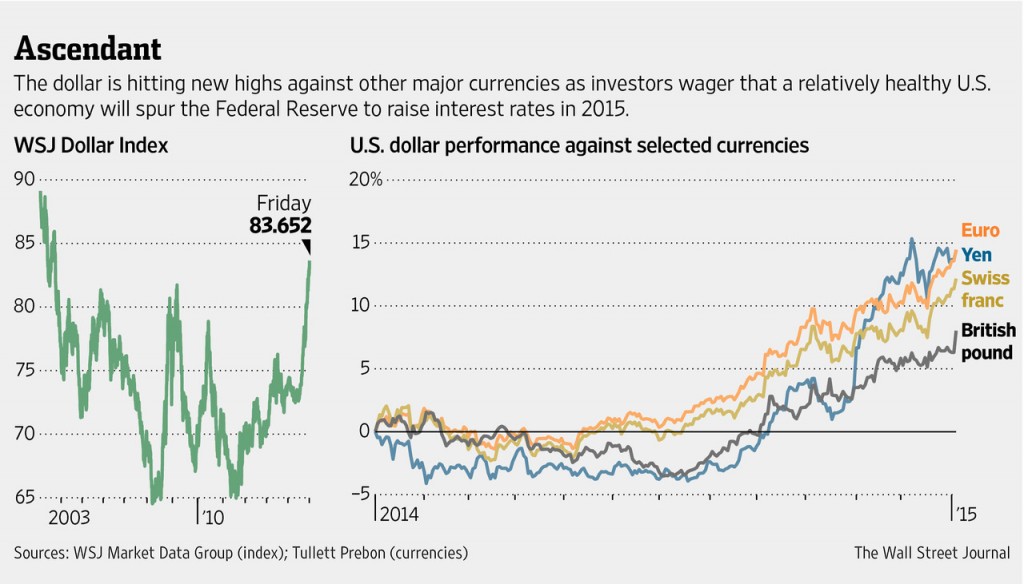Keeping It Simple In 2015
NOTE: Every week or two I wrote a Client Note for my clients. I post most but not all of the notes to my blog but with a time delay usually between 1 day and 1 week. To receive the Client Notes at the same time as my clients, sign up in the box in the right hand corner of the website.
*****
As we start off 2015 on a down note a number of concerns are weighing on markets.
First is the collapse in oil prices. This is obviously bad for oil companies. It is also bad for employment in oil related sectors which have created many solid middle class jobs in recent years. For example, Hercules Offshore (HERO), a Houston based oil services company, is laying off 324 employees, 15% of its workforce, because companies aren’t renewing its contracts in the Gulf of Mexico (“Oil Jobs Squeezed As Prices Plummet”, December 27, 2014, WSJ A1). It is also bad for oil heavy economies such as North Dakota and Texas. In the 1980s, an oil bust in Texas led to a collapse in the real estate market which resulted in a banking crisis (“Plunging Oil Prices Test Texas’ Economic Boom”, January 5, 2015, WSJ A1).
On the flip side, the drop in oil prices is a boon to the rest of the economy. It puts more money in the pockets of consumers who spend less money on gas. It similarly increases the margins and profits of companies who are energy consumers. As is frequently the case in economics, there is a concentrated impact on a specific group but a more diffuse, but just as significant, impact on the larger society.
These facts are associated with two narratives about the fall in oil prices. The bearish narrative suggests that the collapse in oil prices stems from a decline in demand and is the first domino in what will be another global economic collapse in financial asset prices. This is what has so many concerned about the meaning of the fall in oil prices. The bullish narrative suggests that the collapse in oil prices stems from an increase in supply and, while painful for the oil related sectors and regions, is a boon to the world economy overall.
Another concern is the rising dollar. The dollar index rose 12% in 2014. This is bad for our exports which made up 15% of the economy in 2013. A rising dollar makes our exports more expensive for countries whose currencies are losing value against it. “Expect the worst for US trade” Allen Sinai Chief Global Economist of Decision Economics told The Wall Street Journal. 3M’s (MMM) CFO said last month that the rising dollar would trim 2-3% off sales in 2015 (“Dollar Surges to 11 Year High Against Biggest Rivals”, January 3, WSJ A1).
However, as with oil, the strong dollar also results in economic benefits. While our exports become more expensive, imports become cheaper. Just as it is cheaper for us to travel in foreign countries, it is cheaper for us to buy their goods.
The main reason the dollar is rising, starting in the second half of 2014, is expectations that the Federal Reserve will begin raising interest rates for the first time in a decade in 2015. This is happening at a time when our main rivals, such as Japan and Europe, are actually loosening monetary policy with large doses of quantitative easing.
This has led many to believe the market, which has been propelled by Fed policy, is due for a fall this year as well. In fact, it is not too much to say that the market is “obsessed” with Fed policy. However, Janet Yellen is very aware of the market’s obsession and her dovish orientation is likely to cause her to move slowly and carefully. The Fed has shown deference to the market in recent years and I see no reason to expect that to change.
That is why I am keeping things simple heading into 2015. The bull market remains intact and I expect that to continue for the immediate future. I will be watching the oil market and Fed policy very carefully to detect any inflection points but for the moment I am maintaining the status quo in our portfolios. In fact, I used today’s selloff to add to our positions in Apple (AAPL) and Facebook (FB) as well as initiating a small position in natural gas producer Southwestern Energy (SWN).
Greg Feirman
Founder & CEO
Top Gun Financial (www.topgunfp.com)
A Registered Investment Advisor
Bay Area, CA
(916) 224-0113
FOLLOW ME ON Twitter, LIKE ME ON Facebook AND INVEST LIKE ME WITH CoVestor!

